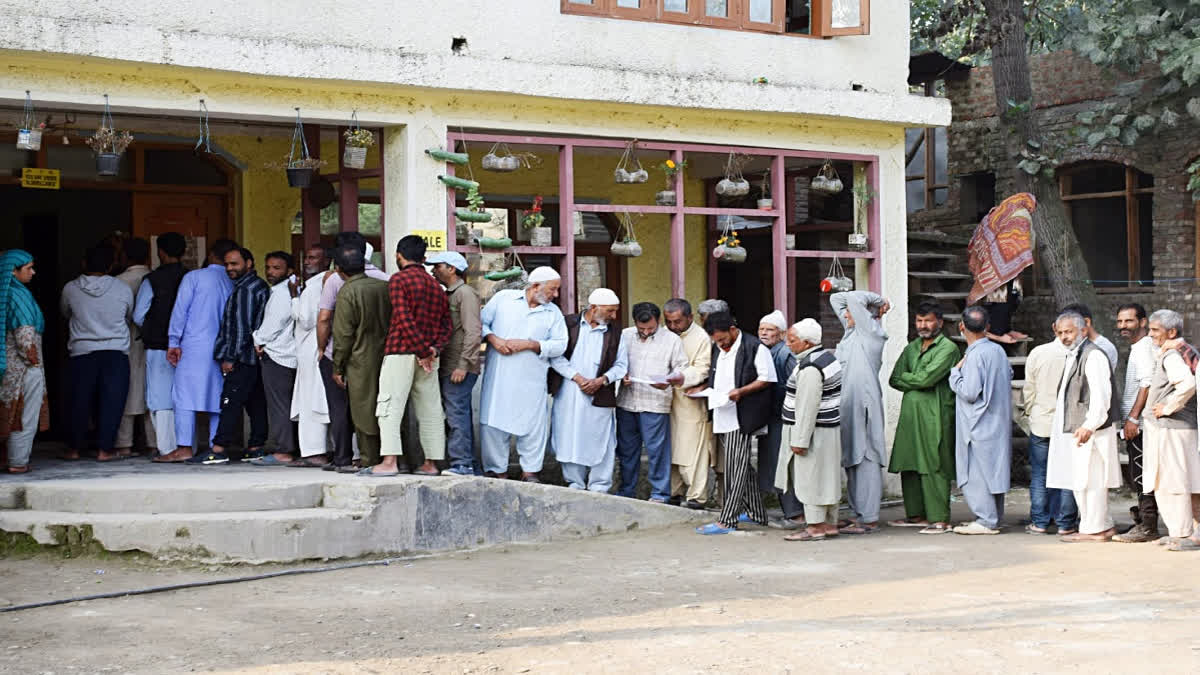Srinagar (Jammu and Kashmir): The second phase of polling for the Jammu and Kashmir Assembly elections recorded a tentative voter turnout of over 54.11% on Wednesday, as voters across 26 constituencies actively participated in the electoral process. According to officials, the polling was conducted smoothly with no significant disruptions, aside from minor incidents involving arguments between voters.
Chief Electoral Officer (CEO) P K Pole addressed the media in Srinagar after the polls, sharing provisional voter turnout figures. He noted that the 54.11% turnout was based on early reports, with final numbers expected to rise as voting continued in some areas, including Hazratbal and Reasi.
"The polling was overall peaceful. Some stray incidents like arguments took place, but there is no need for re-poll anywhere," Pole stated, emphasising the largely calm nature of the elections.
A key highlight of this phase was the presence of a 16-member delegation of foreign envoys, who observed the election process firsthand. Their visit marked a historic moment, as it was the first time international observers were allowed to witness elections in the region since the insurgency erupted in the late 1980s.
The decision to allow foreign envoys to observe the polls was met with criticism from certain political circles. Former Jammu and Kashmir chief minister Omar Abdullah criticised the visit of a foreign delegation to Jammu and Kashmir, calling it "not the right thing."
He stated that the Centre has consistently disregarded the foreigners' observations on Jammu and Kashmir, asserting that the region is an internal issue of India.
"Why are you (the Central government) inviting them (the delegation) here then? What is the rationale behind bringing diplomats to Kashmir for tours while foreign journalists are barred from visiting? Foreign journalists have also sought permission to cover the elections here, but they were denied. Why?" Omar questioned.
To ensure smooth conduct of the elections, security forces were deployed across sensitive areas, contributing to a largely peaceful polling process.
The second phase of voting saw 24.78 lakh eligible voters deciding the fate of 239 candidates across 26 constituencies in six districts. High-profile candidates such as Omar Abdullah, Ravinder Raina, Altaf Bukhari, and Khursheed Alam were among those contesting in this phase.
In the Kashmir Division, 15 constituencies spanned the districts of Ganderbal, Srinagar, and Budgam, with key areas including Hazratbal, Ganderbal, Khanyar, and Budgam. In the Jammu Division, 11 constituencies—including Gulabgarh (ST) and Rajouri (ST)—stretched across the districts of Reasi, Rajouri, and Poonch. Strategic constituencies along the Line of Control (LoC), such as Kalakote-Sunderbani and Thannamandi (ST), were also part of this phase.
Of the 25.78 lakh eligible voters, 13.12 lakh were male, 12.65 lakh female, and 53 were third-gender voters. The Election Commission of India (ECI) set up 3,502 polling stations, ensuring transparency through webcasting at all locations. Special polling stations included 157 Pink Polling Stations managed by women, green stations, and those overseen by PwDs and youth volunteers.
Voting commenced at 7 am and concluded at 6 pm. The counting of votes for all three phases will take place on October 8.



